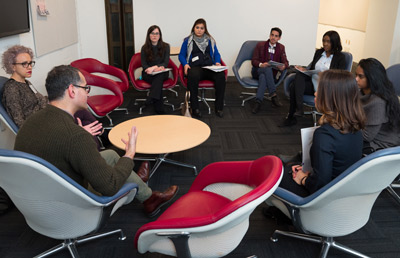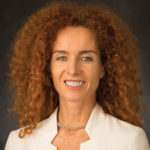2018 Graduate Education | International Affairs
THIS GUIDE IS NO LONGER ACTIVE. For the current FP Guide, click here.
NYU School of Professional Studies,
Center for Global Affairs
This year, the NYU School of Professional Studies (NYUSPS) Center for Global Affairs (CGA) is celebrating its 14th anniversary. Although it has been in existence for less than two decades, CGA has developed a stellar reputation in the areas of teaching, research, and learning that is brimming with energy, new ideas, and innovative ways of viewing the world.
 “The Center was originally established because NYUSPS sensed that international relations programs offered at other institutions of higher learning were too limited. They weren’t adequately addressing non-state actors and the onslaught of disruption on multiple levels and layers in a rapidly changing world,” says Carolyn Kissane, a clinical associate professor and academic director of CGA, who also serves as the coordinator of the Environment/Energy Policy concentration in CGA’s MS in Global Affairs program.
“The Center was originally established because NYUSPS sensed that international relations programs offered at other institutions of higher learning were too limited. They weren’t adequately addressing non-state actors and the onslaught of disruption on multiple levels and layers in a rapidly changing world,” says Carolyn Kissane, a clinical associate professor and academic director of CGA, who also serves as the coordinator of the Environment/Energy Policy concentration in CGA’s MS in Global Affairs program.
“Many of the traditional international relations theories are based on a post–World War II framework that doesn’t really capture the challenges of the 21st century,” she asserts. “Those theories were designed around nation states, not multiple powers pressuring the global system in the way we have today.”
In addition, traditional theories tend to be Western-centric. “When I teach the geopolitics of energy, if we looked only at North America and Europe, we would totally miss the global energy picture and the new demand coming from Asia,” Kissane says.
What makes the CGA MS in Global Affairs program unique is its flexible curriculum, which reflects what is happening in the world today, she notes. “We pride ourselves on being innovative and entrepreneurial in how we approach teaching and encourage student initiative. We are always thinking of ways to connect our students with the industries and organizations they are learning about—and where they ultimately would like to base their careers.”

“We pride ourselves on being innovative and entrepreneurial in how we approach teaching and encourage student initiative.” –Carolyn Kissane, Clinical Associate Professor and Academic Director, Center for Global Affairs, NYU School of Professional Studies
Students also benefit from multiple opportunities to apply what they are learning. For example, in “Hacking for Energy,” a popular course that was introduced last year, student teams develop and test solutions that address real-world problems facing the energy and sustainability sectors.
Next spring, CGA will offer a new course on disinformation and its role in promoting conflict, insecurity, and instability, not just in the political domain, but also in our financial institutions and our personal lives.
And for fall 2019, CGA will offer a new MS in Global Security, Conflict, and Cybercrime.
“Many of our political officials don’t understand and are unprepared for thinking about security problems in the way they need to be,” says Kissane, who teaches graduate courses in resource security. “It’s a big issue that confronts utilities, power plants, and the grid. As the grid gets smarter, it also becomes potentially more vulnerable.”
For the past five years, CGA has offered a program that enables students to work with the United Nations Counterterrorism Committee on problems involving global security.
The Center also offers six to eight Global Field Intensives each year, during which students travel to a location abroad where a faculty member has experience and networks. Recently, students have traveled to Tanzania, Uganda, and Bolivia to study pressing issues such as sustainable development and migration.
In addition to its broad array of opportunities around the globe, CGA attracts a wide range of international students to its New York City campus. “We are proud of our diverse student population,” says Kissane. “Our international students share their perspectives on what they see in their home countries. They help widen our view of the world.”
Graduate Degree Program in International Affairs:
• MS in Global Affairs
Visit the Request Info page to receive more information.
Contents
- 2018 Graduate Education | International Affairs
- Johns Hopkins University, School of Advanced International Studies (SAIS)
- UC San Diego, School of Global Policy and Strategy (GPS)
- NYU School of Professional Studies, Center for Global Affairs
- University of Notre Dame, Keough School of Global Affairs
- Georgetown University, Walsh School of Foreign Service (SFS)
- SOAS University of London
- Yale University, Jackson Institute for Global Affairs
- University of Kent, Brussels School of International Studies (BSIS)
- Seton Hall University, School of Diplomacy and International Relations
- The Fletcher School of Law and Diplomacy at Tufts University
- University of Denver, Josef Korbel School of International Studies
- Arizona State University, Center on the Future of War